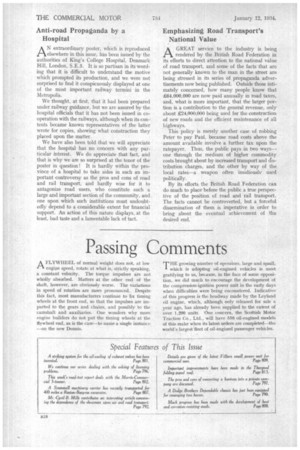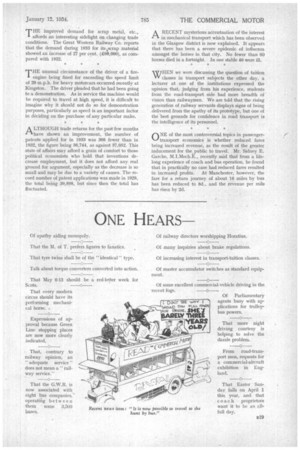Passing Comments
Page 36

Page 37

If you've noticed an error in this article please click here to report it so we can fix it.
A FLYWIIEEL of normal weight does not, at low
engine speed, rotate at what is, strictly speaking, a constant velocity. The torque impulses are not wholly absorbed. Matters at the other end of the shaft, however, are obviously worse. The variations in speed of rotation are more pronounced. Despite this fact, most manufacturers continue to fix timing wheels at the front end, so that the impulses are imparted to the gears and chains, and possibly to the camshaft and auxiliaries. One wonders why more engine builders do not put the timing wheels at the flywheel end, as is the case—to name a single instance —on the new Dennis. T HE growing number of operators, large and small, which is adopting oil-engined vehicles is most gratifying to us, because, in the face of some opposition, we did much to encourage the development of. the compression-ignition power unit in the early days when difficulties were being encountered. Indicative of this progress is the headway made by the Leyland oil engine, which, although only released for sale a year ago, has already been supplied to the extent of over 1,200 units. One concern, the Scottish Motor Traction Co., Ltd., will have 550 oil-engined models of this make when its latest orders are completed—the world's largest -fleet of oil-engined passenger vehicles. THE improved demand for scrap metal, etc., affords an interesting sidelight on changing trade conditions. The Great Western Railway Co. reports that the demand during 1933 for its scrap material showed an increase of 27 per cent. (290,000), as compared with 1932.
THE unusual circumstance of the driver of a fire.' engine being fined for exceeding the speed limit of 20 m.p.h. for heavy motorcars occurred recently at Kingston. The driver pleaded that he had been going to a demonstration. As in service the machine would be required to travel at high speed, it is difficult to imagine why it should not do so for demonstration purposes, particularly as speed is an important factor in deciding on the purchase of any particular make.
A LTHOUGH trade returns for the past few months 4—khave shown an improvement, the number of patents applied for in 1933 was 308 fewer than in 1932, the figure being 36,744, as against 37,052. This state of affairs may afford a grain of comfort to those political economists who hold that inventions decrease employment, but it does not afford any real ground for argument, especially as the decrease is so small and may be due to a variety of causes. The record number of patent applications was made in 1929, the total being 39,898, but since then the total has fluctuated. ARECENT mysterious accentuation of the interest in mechanical transport which has been observed in the Glasgow district is now explained. It appears that there has been a severe epidemic of influenza amongst the horses in that city. No fewer than 60 horses died in a fortnight. In one stable 40 were ill.
WHEN we were discussing the question of tuition classes in transport subjects the other day, a lecturer at one of the institutions expressed the opinion that, judging from his experience, students from the road-transport side had more breadth of vision than railwaymen. We are told that the rising generation of railway servants displays signs of being delivered from the apathy of its prototype, but one of the best grounds for confidence in road transport is the intelligence of its personnel.
ONE of the most controversial topics in passengertransport economics is whether reduced fares bring increased revenue, as the result of the greater inducement for the, public to travel. Mr. Sidney E. Garcke, M.I.Mech.E., recently said that from a lifelong experience of coach and bus operation, he found that in practically no case had reduced fares resulted in increased profits. At Manchester, however, the fare for a return journey of about 16 miles by bus has been reduced to 8d„ and the revenue per mile has risen by 2d.




































































































